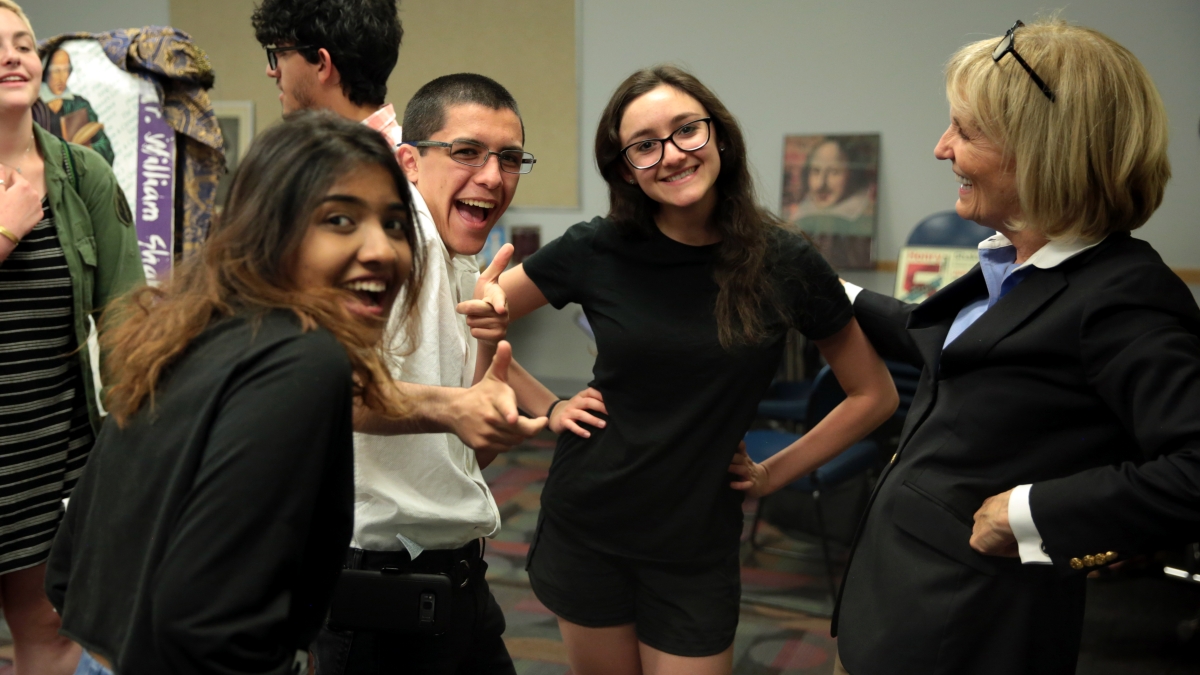ASU launches summer Civic Leadership Institute for high school students

Civic Leadership for high school students combines civic education and an introduction to dorm life. Photo by Gage Skidmore
This summer, Arizona State University's School of Civic and Economic Thought and Leadership launches its inaugural Civic Leadership Institute, a weeklong residential camp designed to introduce rising high school sophomores, juniors, and seniors to college-level courses that give them a deeper understanding of the rights and liberties granted by the U.S. Constitution.
With critical issues like DACADeferred Action for Childhood Arrivals and school shootings specifically affecting teenagers, high school students are mobilizing in unprecedented numbers to organize rallies, social media campaigns, voter registration drives, and political rallies before they are even eligible to head to the polls themselves.
These youth activists are undertaking leadership roles in their communities, and chances are, they will continue on the path of civic engagement well beyond high school. The Civic Leadership Institute introduces these students to resources that help them discuss and debate current affairs and the big ideas that affect them so that they can galvanize their peers and civic leaders to address crucial problems and develop constructive alternatives.
"High school students today find themselves in the middle of some of the most heated political issues of our time," said Professor Peter McNamara. “The Civic Leadership Institute aims to provide students with the civic and intellectual tools needed to understand and to participate thoughtfully in these controversies.”
Inspired by similar programs at Notre Dame, Princeton, Columbia, and Yale, the Civic Leadership Institute gives students a preview of college-level coursework in a Socratic, small-class environment while introducing them to dorm life on a university campus.
The curriculum, which is drawn from School of Civic and Economic Thought and Leadership courses, focuses on the theoretical foundations of the rights granted by the U.S. Constitution. Students will become familiar with the complicated history of constitutional interpretation and explore current debates from multiple perspectives about the meaning of those rights and liberties.
“The Civic Leadership Institute is premised on the idea that civic participation is enhanced by civic education. In order to be an effective force for good within our constitutional system, aspiring leaders should learn and think about the constitutional rights and liberties we have, the meaning and nature of those rights and liberties, the controversies surrounding them, and their importance,” Professor Zack German said.
“It may seem strange that the debates, concerns, and ideas of 2018 could somehow be related to those of the 1780s, or, in the case of the 14th Amendment, the 1860s. But we'll spend the week exploring how that is the case — how the rights and liberties in the Constitution and the Supreme Court's interpretations of the Constitution are still meaningful to our political life today.”
Participants who complete the session will have a general understanding of topics like rights, constitutionalism and judicial review, and specifically will strengthen their understanding of free speech, freedom of the press, freedom of religion, the right to keep and bear arms, equal protection under the law and due process.
For the final project of the week, students will break into teams of attorneys, justices, and petitioners and apply their constitutional expertise in a moot Supreme Court hearing, where they will debate issues relevant to teens.
The week isn't all work and no play, though. Planned social activities, including communal meals and movie nights, and an introduction to dorm life under the supervision of residential advisors, will give students the opportunity to meet and connect with other students and explore campus life at ASU.
Here's what participants can expect from a typical day at the Civic Leadership Institute:
7–9 a.m. — Breakfast
9–10 a.m. — Morning study
10–11:30 a.m. — Session 1: Interactive lecture, breakout groups, and group discussion
11:30 a.m.–1:30 p.m. — Lunch and break
1:30–3 p.m. — Session 2: Interactive lecture, breakout groups, and group discussion
3–3:30 p.m. — Afternoon break
3:30–5 p.m — Session 3: Interactive lecture, breakout groups, and group discussion
5–5:30 p.m. — Afternoon break
5:30–7 p.m. — Dinner
7–8:30 p.m. — Fun! Social/team-building activities
8:30–10 p.m. — Moot Court preparation
Registration ends May 23, and financial assistance is still available on a first-come, first-served basis. For more information, contact Academic Success Coordinator Susan Kells.
More Law, journalism and politics

Veteran journalists Jorge Ramos and Marty Baron talk democracy and free press
Arizona State University hosted "Truth Across Borders," a bilingual panel featuring two of America’s most iconic journalists,…
Can elections results be counted quickly yet reliably?
Election results that are released as quickly as the public demands but are reliable enough to earn wide acceptance may not…
Spring break trip to Hawaiʻi provides insight into Indigenous law
A group of Arizona State University law students spent a week in Hawaiʻi for spring break. And while they did take in some of the…

